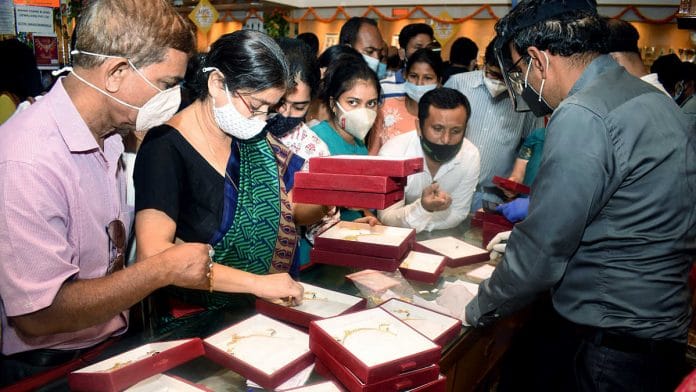New Delhi: The Economic Survey released Friday said a resilient V-shaped economic recovery is underway in India, but pointed out that despite an expected growth of 11 per cent in 2021-22, growth will only be 2.4 per cent above the 2019-20 levels.
The 2020-21 survey, authored by Chief Economic Adviser Krishnamurthy Subramanian, also said India’s fiscal slippage in the current financial year will be “transient”, and stressed the need for economic growth to ensure sustainability of debt or India’s ability to pay the interest and principal amounts of its borrowings.
The survey also criticised India’s sovereign credit ratings, pointing out that the rating agencies do not capture its ability to pay and its “gold standard” of having never defaulted on its debt repayments. It also lauded India’s “mature policy response” to the pandemic and said it provides “important lessons for democracies to avoid myopic policymaking and demonstrates the significant benefits of focusing on long-term gains”.
“Starting July, a resilient V-shaped recovery is underway, as demonstrated by the recovery in GDP growth in Q2 after the sharp decline in Q1, a sustained resurgence in high frequency indicators such as power demand, e-way bills, GST collection, steel consumption, etc,” said the Economic Survey, tabled by Finance Minister Nirmala Sitharaman in Parliament.
“The V-shaped economic recovery is supported by the initiation of a mega vaccination drive with hopes of a robust recovery in the services sector. Together, prospects for robust growth in consumption and investment have been rekindled with the estimated real GDP growth for FY 2021-22 at 11 per cent,” it added.
The survey stressed that future growth prospects would depend on sustenance of momentum of this recovery.
Also read: Economic Survey lauds India’s Covid approach, notes Kerala, Telangana, AP saved most lives
Only 2.4% over 2019-20
The Economic Survey said the combination of the expected 11 per cent growth in 2021-22 and the estimated 7.7 per cent contraction in 2020-21, would “entail a growth in real GDP by 2.4 per cent over the absolute level of 2019-20 — implying that the economy would take two years to reach and go past the pre-pandemic level”.
“The global economy, including India, has been set back in time by the pandemic-induced crisis. In the five years before 2020-21, the Indian economy grew at an average of 6.7 per cent,” it pointed out. “In 2021-22, a sharp recovery of real GDP growth of 10-12 per cent is expected based on a low base effect and inherent strengths of the economy.”
However, it added that assuming the economy grows at 6.5 per cent in 2022-23 and 7.0 per cent in 2023-24, India would still be around 90 per cent below the trend level of output by 2023-24.
Transient fiscal slippage
The Economic Survey also talked about how a slippage in fiscal deficit in 2020-21 will be temporary, and underlined the need to boost growth to finance the fiscal deficit.
“Keeping in view the revenue shortfall and the demand for higher expenditure during the year, the government is expected to register a fiscal slippage in 2020-21. This deviation from the path of fiscal consolidation may, however, be transient as the fiscal indicators rebound with the recovery in the economy. Thus, focusing on boosting GDP growth would be pivotal for enabling a sustainable fiscal path in the medium term,” it said.
The survey favoured the adoption of countercyclical expansionary fiscal policy in times of crisis, as it will boost GDP growth both directly and indirectly through multiplier effects on private consumption expenditure and private investment. But it did not favour irresponsible fiscal behaviour.
It added that India’s fiscal policy must not remain beholden to credit ratings, terming them a “biased measure of India’s fundamentals”.
“Despite ratings not reflecting fundamentals, noisy, opaque and biased credit ratings damage FPI (foreign portfolio investment) flows. It is therefore imperative that countries engage with CRAs (credit rating agencies) to make the case that their methodology must be corrected to reflect economies’ ability and willingness to pay their external obligations,” the survey said.
Also read: What to expect from Budget 2021? Support people who lost income in pandemic, boost demand






